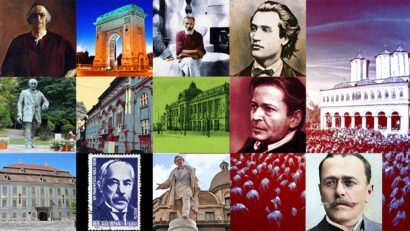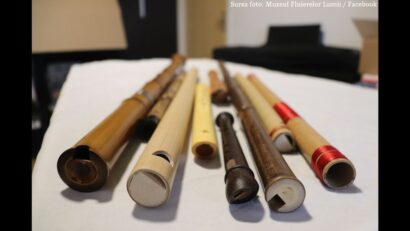Director Paul Calinescu
Born 112 years ago, on the 21st of August 1902 in Galati, eastern Romania, Paul Calinescu won the award for best documentary at the International Film Festival in Venice in 1939, with his movie “The Moti Land”. It was one of the first international awards given to Romanian film, and “The Moti Land” is still a valuable piece, from an esthetic point of view. The political troubles that Romania went trough during and after the Second World War, pushed Paul Calinescu into the area of propaganda movies. In 1941 he directed a documentary on “Romania in the war against the Bolshevism”, only to find himself directing a pro-communist film in 1949, entitled “The Valley Echoes”. Manuela Cernat, a film historian, told us about Paul Calinescu’s cinematic journey:
România Internațional, 30.08.2014, 12:17
Born 112 years ago, on the 21st of August 1902 in Galati, eastern Romania, Paul Calinescu won the award for best documentary at the International Film Festival in Venice in 1939, with his movie “The Moti Land”. It was one of the first international awards given to Romanian film, and “The Moti Land” is still a valuable piece, from an esthetic point of view. The political troubles that Romania went trough during and after the Second World War, pushed Paul Calinescu into the area of propaganda movies. In 1941 he directed a documentary on “Romania in the war against the Bolshevism”, only to find himself directing a pro-communist film in 1949, entitled “The Valley Echoes”. Manuela Cernat, a film historian, told us about Paul Calinescu’s cinematic journey:
Manuela Cernat: “Paul Calinescu must be seen as a pioneer of the Romanian cinema. He established a cinematography fund in the early 1930’s by taking over the taxes that movie distributors paid; this fund was the basis for the establishment of the National Office for Cinematography. He also brought Romania its first international award with his movie “The Moti Land”. In the early 1940s, when Romania entered World War Two, Paul Calinescu and the director of the National Office for Cinematography, Ion Cantacuzino, directed two impressive movies that also won prizes at the International Film Festival in Venice. They were called “Us” and “Romania in the war against Bolshevism”. After the communists seized power, Ion Cantacuzino was imprisoned and Paul Calinescu avoided a similar fate by directing a propaganda movie, which can now be seen as a mockery towards the regime. Subsequently, Paul Calinescu withdrew from the sphere of political films and directed a number of remarkable films.”
He retired in 1965, after he directed his last movie, “Titanic Waltz”. Manuela Cernat tells us more about his retirement: “He was simply cast aside, because, as the political regime in Romania hardened, intellectuals were increasingly viewed as undesirable, and the perceived ‘flaws’ in Calinescu’s biography and cinematography led to his removal from film sets. At one point he was celebrated at the Radio Hall, and his award-wining documentary, “The Moti Land” was also shown. The soundtrack had been written by Paul Constantinescu, and the off-camera commentary was read by Mihail Sadoveanu. The text proved to be prophetic, considering the fact that, two years after the movie was launched in 1939, the Second Vienna Award reassigned this area from Romania to Hungary.”
Manuela Cernat also explains Paul Calinescu’s involvement in post-war propaganda: “This was an extremely tragic time for Romania’s intellectuals, who were undeservingly faced with hard ethic and esthetic choices. It is very difficult for us to judge the compromises they had to make, but what we can say is that Paul Calinescu’s films were a testimony to the atrocities the Soviet army committed during their occupation in Bessarabia and Bukovina and they could not be aired in Romania until 1995-1996. Paul Calinescu’s case is symbolic for that period, but the films he directed before communism remain shattering evidence of the war. ”
Paul Calinescu died in 2000. Two books have so far been published in Romania, one in 1982 and another 1996, which focus on his professional accomplishments.





























